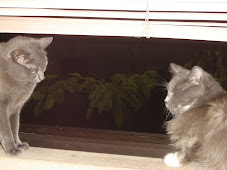domenica 23 dicembre 2007
lunedì 10 dicembre 2007
My Personal Learning Environment (e-tivity 9)
Hi everyone!
Thanks to e-tivity 9 I learnt how to build my PLE (Personal Learning Environment). Unfortunately, there’s not only one definition of PLE because it’s a new concept. If you want to know some viewpoints on PLE visit our course blog. I’d like to tell you my own definition of PLE. In my opinion, it’s a collection not only of free web-based tools (as Fitzgerald pointed out), but also of experiences, places, people contributing to someone’s learning. I think that building my own PLE can be helpful because I can realize what elements help me learning English. I can understand when, where and how I learn, and this can also prove useful in the future because I can keep those elements for my lifelong learning. Moreover, I can realize that I learn especially in informal contexts, which can be reproduced whenever I want. According to my definition of PLE I tried to build my own map through FreeMind.
I decided to divide my PLE into four sections entitled PEOPLE, GATHERING INFORMATION, USING INFORMATION, SPACES, and PAST EXPERIENCE.
PEOPLE: This section contains all the people that help me learning English. I mentioned native speakers such as teachers, professors, MySpace friends, American students participating in Albany-Padova exchange (forum). These people play a key role because they can teach me English from different viewpoints (pronunciation of words, intonation of discourse segments, vocabulary, grammar, etc.). Anyway, I also think that non-native speakers can be very important to help me learning English. For example I mentioned foreign people who are non-native speakers such as Skype friends, or other non-native speakers such as my sister, who spent two months in Namibia (English is the official language in Namibia) and some friends who studied abroad (in England and India). Thanks to them I can enrich my vocabulary and improve my English. Moreover, talking/discussing with my classmates can be useful to learn English.
GATHERING INFORMATION: I wrote many things in this section because I usually gather information from different sources. I divided the section into two subsections: ‘formal learning (at university)’ and ‘informal learning (at home)’. As you can see, the second subsection is more detailed because it deals with many web-tools, music and satellite TV. ‘Informal learning’ contains search engines (i.e. Google and Technorati), websites (i.e. blogs, educational sites, online newspapers), a social bookmarking site (i.e. del.icio.us), a feed aggregator (i.e. Bloglines), social networking websites (i.e. MySpace and Facebook), video and audio tools (i.e. YouTube and TeacherTube videos, podcasts, songs, satellite TV), instant messaging programs (i.e. Messenger and Skype), a forum (Albany-Padova forum), an online encyclopaedia (i.e. Wikipedia). ‘Formal learning’ contains lectures, lab and speaking lessons, books. I think that informal learning plays a fundamental role because I can learn English every day through my computer (or even through my mp3 player or TV!). All these tools show that learning can be available to anyone. That's great!
USING INFORMATION: Here I explained what I usually do with the information gathered from various sources. It’s an important section because it deals with my own work: writing blog posts, discussing with my classmates, participating in Padova-Albany forum, teaching English to a child, etc. As you can notice, I usually use information to communicate and share my ideas with others. I also use information to teach English to a ten-year boy, and I find great satisfaction in doing it. Moreover, I use and work with information when I check its reliability and correctness, for example by surfing the Net or consulting dictionaries.
SPACES: This section explains where I learn English. These spaces are virtual (web-tools/Web 2.0) and physical, e.g. university, home, or foreign countries (i.e. when I travel).
PAST EXPERIENCE: This section contains information on how I learnt English in the past. For example, I mentioned the lessons at elementary, middle, high school, the lectures I attended, my travels (e.g. in
Is my PLE different from yours?
See you!
Giovanna
sabato 1 dicembre 2007
An interesting website...

A friend of mine wrote me an e-mail and avised me to visit an interesting website. It' s called FreeRice and it wants to help people enriching English vocabulary for free and provide rice to hungry people for free. Maybe you are wondering what I'm talking about so have a look at the site: FreeRice.
See you!
Giovanna
(photo source)








